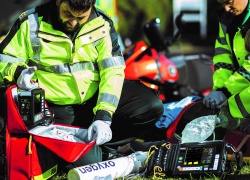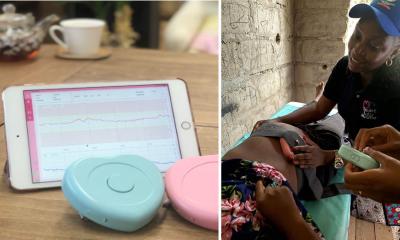Defibrillation
RDT shows new system to monitor defibrillation at Arab Health
RDT, a leading provider of pre-hospital care solutions, will be previewing its Tempus ALS™ monitor defibrillator at Arab Health 2017. Visitors to Stand Z1A59 will be able to see this innovative solution – which offers the benefits of a fully ERC-compliant defibrillator and an advanced monitor in a small and lightweight package – ahead of its official launch later in the year.

Tempus ALS delivers a new, cutting-edge approach to monitoring defibrillation. Its market-leading robustness, small size, low weight and flexible configuration provide unparalleled choices on how pre-hospital equipment is deployed and operated. The advanced monitor provides a full set of vitals – including 12-Lead ECG, configurable STEMI reporting and capnography – with over 10 hours of battery life. It also gives access to advanced features such as video laryngoscopy, point of injury ultrasound and real-time telemedicine. The defibrillator is lighter and smaller than most AEDs, but with manual defibrillation, AED, cardioversion, pacing, CPR feedback and a 4-Lead ECG. Its small battery is capable of delivering 300 shocks, so users can stop worrying about battery life. Because it is small and light enough to always be carried to scene, it also means code review is always available for every incident.
Tempus ALS’s market-leading data collection and connectivity also offer significant benefits for patient management. Its unique patient Summary Record of Care™ (SRoC™) provides automated recording of all vital sign data, defibrillation and CPR therapies, event capture video and photographic images. This unique feature enables flexibility of data printing, transmission and sharing for optimised patient care. It is compact, slender and lightweight enough to suit all vehicles, including bikes. This means the same standard of care can be provided from any vehicle type, and space is freed up for other important equipment.
For continuity of care, the data collected in the field can be quickly and easily shared in a number of ways, including monitor-to-monitor transfer, transfer via USB, email or directly into a hospital’s own ePCR, ensuring that therapy data is always available for follow-up patient care. The flow of data is further enhanced by the advanced monitor’s ReachBak™ telemedicine capability. This feature offers real-time data streaming, enabling emergency departments to assess and plan a patient’s care before they even arrive. For example, pre-hospital STEMI or MI patients can be transferred directly from the ambulance to the cath lab, saving precious door to needle time. Backed by over 20 years of RDT service and support expertise, this all adds up to pre-hospital medics carrying less, doing more and working smarter.
To learn more about the Tempus ALS, visit the RDT team on Stand Z1A59, or go to www.tempusals.com
About Remote Diagnostic Technologies Ltd
RDT specialises in the design and manufacture of medical devices, including pre-hospital care vital signs monitors. Specialist technologies include compact and highly integrated vital signs monitors for both medical professional and non-medically trained users, as well as intermittent users. The award-winning Tempus system provides innovative, easy to use and reliable medical device solutions to help manage medical incidents for the military, civilian pre-hospital care market and other remote and challenging locations.
26.01.2017











